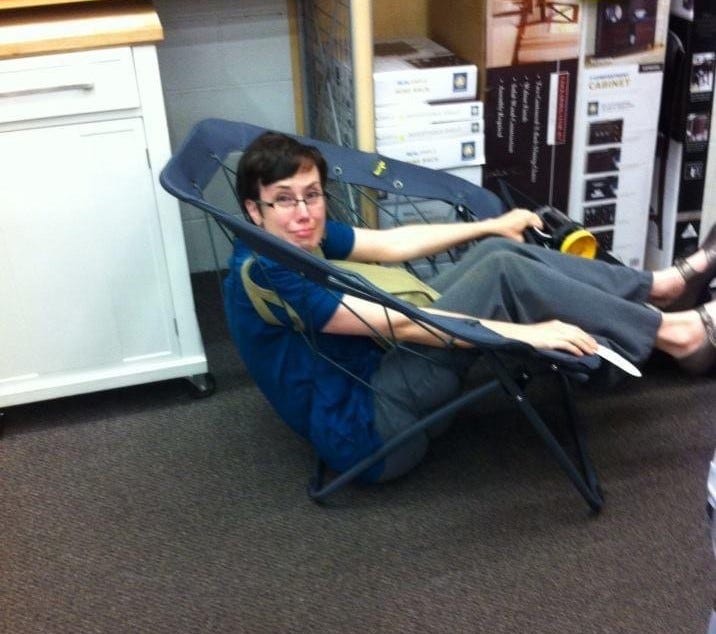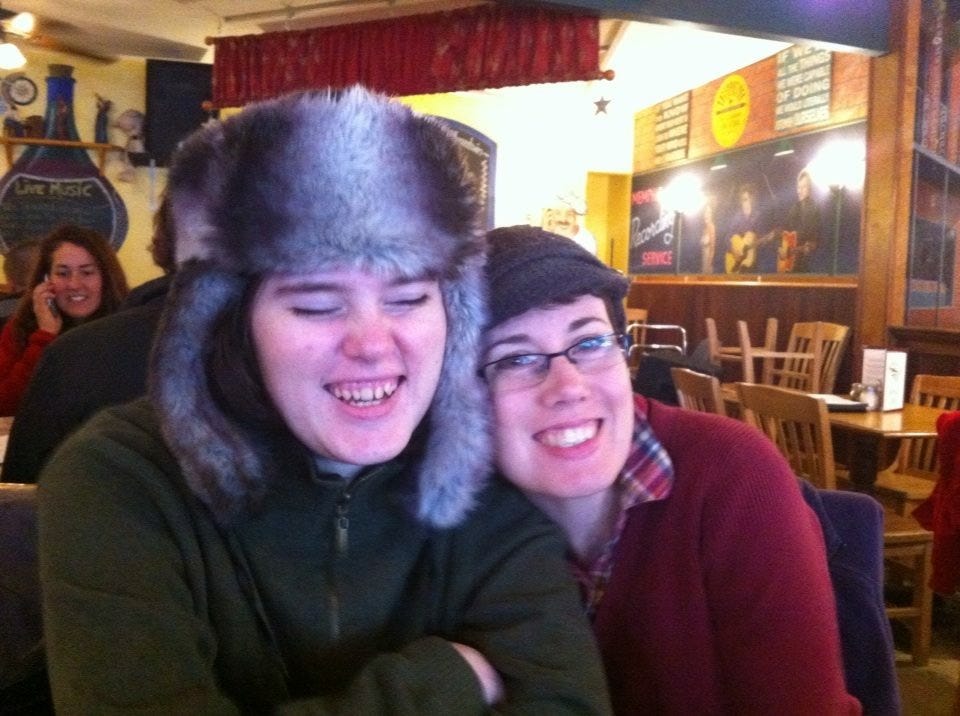Conversations With Eldest Child: Coming Out in the Canned Goods Aisle
Shopping with Eldest Child has always been a bit of an adventure.

Shopping with my Eldest Child has always been a bit of an adventure.
When she was three, the crinkling sound I heard from my car’s back seat turned out to be a stealth maneuver to liberate a package of Oreo cookies from one of the shopping bags. I confiscated the contraband and told her she could have some after lunch. When we got home, I put the Oreos on top of the refrigerator while I had a quick bathroom break. I came back into the kitchen to find that she had climbed onto the counter, snatched the entire bag down, and whatever cookie chunks weren’t on the floor, her shirt, or her face were being crammed into her mouth at a speed that would shame a chipmunk.
Points for goal-oriented tenacity, kiddo. Now if you’ll excuse me, I’ve got to get my heart rate and blood pressure back under control and figure out how to upgrade the household babyproofing to account for sugar-buzzed parkour.
At age four, she promised me she could walk beside the shopping cart instead of riding in it. I gave her the benefit of my significant doubts and let her try. She immediately proceeded to flaunt her newfound independence by pulling up the back of my dress, running away giggling, then informing the nice store manager three aisles over that “My mom has blue underwear.”
Had the store lost electrical power, my face was probably glowing red enough to serve as an emergency exit sign.
By eight years old, Eldest Child had finalized her divorce from the majority of the “girls” clothing section. Pink, cropped, covered in glitter, and lacking functional pockets were just not meeting her sartorial needs. She’s still very much like her mother in that regard. My benchmarks for dressing children are clean, comfortable, weather-ready, and structurally sound. Hers were “No princesses, ruffles, or words on my butt.”
I could absolutely work with that. Any objections from her other caregivers were quickly overcome by a subtle blend of diplomatic communication styles: she’d vocally and physically refuse to wear anything else, and I’d ask them if this was the screaming, flailing, half-naked hill they wanted to die on. Nearly two decades later, the armistice still stands.
Eighteen is the age of legal majority. It is not the expiration date for shopping shenanigans. During a trip to Bed, Bath, and Beyond, there was an incident involving a display model bungee chair playing Hungry, Hungry Hippos with my posterior. She would have helped me out of it sooner if she hadn’t been laughing so hard. I guess if I had truly gotten stuck or injured, a picture would have been worth the same thousand words to emergency personnel as it is to the internet.
At 23, she sent me a text saying she really needed to talk to me about something important and asking me to please call her. If you’re the kind of parent who has submarine dive alarms going off in their head after getting a message like that from your kid, join the club.
I was in the middle of grocery shopping at the time, but no way was I going to wait until I had finished to find out what was going on. I called her up right there in the canned goods section, determined to know what was either flooded or on fire, who had died, and whether anyone needed an old priest, a young priest, and possibly a defense attorney.
As it turned out, there was urgency, but certainly not disaster. She wanted to tell me that she is asexual, and that the moment had come for her to be ready to share that with me.
For those who may be unfamiliar with the term, asexuality is a general term to describe individuals that generally do not experience sexual attraction or have a desire for sexual relationships. Asexuality is not the same as celibacy or impotence. Asexuals are not simply choosing to abstain from sexual activity or physically unable to engage in it. They’re not sick or on a diet; they’re just not hungry. Asexuality is also not a medical or mental health condition and does not need to be treated or cured.
Moments like the one in the grocery store that day are what I like to call Parenting Pop Quizzes, and they often tend to happen right after something has either scared, surprised, or stressed the absolute crap out of you. This was one of those times when I knew my reaction was going to have a permanent effect on our relationship one way or the other. I really needed to not screw this up, and the one thing I was sure of was that putting her off in this moment would have done damage.
So, it didn’t really matter where I was or what I was doing. I wasn’t worried about the ice cream melting or who might overhear my end of the conversation. I was more concerned about how nervous she sounded, about listening for as long as she wanted to talk, and about making sure nothing in my response came across as impatient, dismissive, or patronizing. She wasn’t confessing to me. She was inviting me in, and that was a test of trust I did not want to fail.
I thanked her for telling me about this part of herself. I told her I was proud of her. I told her I understood how big and heavy this moment felt. I asked how she wanted to handle telling other family members and told her I would support whatever decisions she made in that regard.
I did not ask her if she was sure, because who am I to think I know anyone better than they know themselves? I did not reassure her that she hadn’t disappointed or embarrassed me, because I didn’t want to even hint that asexuality (or any other orientation or identity) could even be disappointing or embarrassing, ever, for any reason.
I also didn’t tell her not to be scared. I know better. One of the hardest parts of being a parent or a child, I think, is knowing that the world still expects conformity and compliance in far too many ways for really stupid reasons, and that nobody, not even your mom, can love you enough to keep you from ever getting hurt.
One of the reasons it can be difficult for young people to share their identities with their families is a history of non-affirming language or behavior in the home. Being exposed to that makes kids doubt whether their caregivers would still say and think ignorant or hurtful things if they knew who they might be talking about. It creates fear that the answer to that question might be yes.
Our household does our level best not to be like that, and I think (hope) that made that conversation with Eldest Child easier. I would never mock or reject her for any part of her identity, and I think she knew that. It’s still really hard to be vulnerable with deeply personal information, even with the people you love the most. Sometimes especially then. Either things will go as well as you hope or at least maybe not as bad as you fear, and the only way to find out for sure is to say something that can’t be unheard.
Did I handle this well? I hope I did. Most of my parenting and mentoring is based on trying to be the kind of adult I wish I’d had available in a particular situation or time of life, while also recognizing that what would have helped me will not translate universally to everyone else’s situation or needs. The rest is just trial and error on a one-way train with no brakes.
I can’t tell you there’s The One Single Right Way to Respond™ to this kind of situation. What I can strongly recommend is to educate yourself with solid, reputable information about sex, sexuality, gender, orientation, and relationships just as general homework for being a kinder, more inclusive human. If you’re planning on being a parent, you will need this much sooner than you think. Cisgender heteronormativity is one helluva drug, and the assumptions and expectations about Daddy’s Little Pink Princess and Mommy’s Little Heartbreaker in Blue start around the time of your first ultrasound, if not before.
Parenting is hard, and not just for the adults. We can’t always keep our kids from getting hurt or spare either of us from the scary thing. Sometimes, doing the scary thing is necessary to grow and learn. We don’t own these humans we made. Instead, we have the enormous responsibility of privilege to watch them discover and become their full, beautiful, perfectly imperfect selves.
Some days, the bungee chair eats your butt. Other days, you get to have Oreos. I’ll make sure to grab some for you while I’m at the grocery store. Just brush your teeth when you’re done and don’t climb on the kitchen appliances, okay? Okay.




